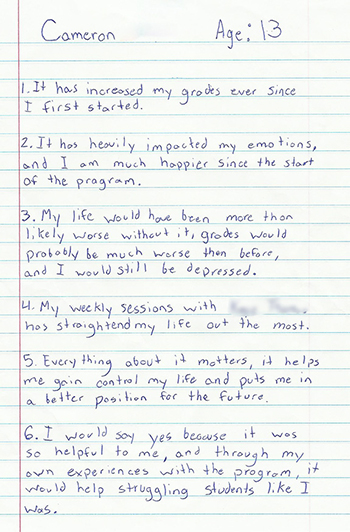
Skip section navigation (navigation may have changed)
Section navigation
Going to therapy
 Lots of teens have some kind of emotional problem. In fact, almost half of U.S. teens will have a mental health problem before they turn 18. The good news is that therapy can really help.
Lots of teens have some kind of emotional problem. In fact, almost half of U.S. teens will have a mental health problem before they turn 18. The good news is that therapy can really help.
Sometimes, people are embarrassed or afraid to see a therapist. But getting help from a therapist because you're feeling sad or anxious is really not different from seeing a doctor because you broke a bone. In fact, you can feel proud for being brave enough to do what you need to do to get your life back on track.
Here are the answers to some common questions about therapy.
- What is therapy?
- Why do teens go for therapy?
- What should I do to get started with therapy?
- What are some kinds of therapy?
- What about online support groups?
What is therapy?  top
top
Therapy is when you talk about your problems with someone who is a professional counselor, such as a psychiatrist, psychologist, or social worker. Therapy sometimes is called psychotherapy. That is because it helps with your psychology — the mental and emotional parts of your life.
If you are going through a rough time, talking to a caring therapist can be a great relief. A therapist can help you cope with sadness, worry, and other strong or scary feelings. Here are some other ways therapy can help:
- It can teach you specific skills for handling difficult situations, such as problems with your family or school.
- It can help you find healthy ways to deal with stress or anger.
- It can teach you how to build healthy relationships.
- It can help you figure out how to think about things in more positive ways.
- It can help you figure out how to boost your self-confidence.
- It can help you decide where you want to go in life and how to deal with any obstacles that may come up along the way.
Therapy may feel great right away, or it might feel strange at first. It can take a little time getting used to talking with someone new about your problems. But therapists are trained to listen well, and they want to help.
As time goes on, you should feel comfortable with your therapist. If you don't feel comfortable, or if you think you're not getting better, tell your parent or guardian. Another therapist or type of therapy might work better.
Therapists protect people's privacy. They can share what you say only in very special cases, such as if they think you are in danger. If you're concerned, though, ask about the privacy policy. It's important to feel like you can tell the truth in therapy. It works best if you are honest about any problems you're facing, including problems with drugs or alcohol or any behaviors that can hurt your body or mind.
Just because you start to see a therapist doesn't mean that you will see one forever. You should be able to learn skills that let you handle your problems on your own. Sometimes, a few sessions are all you need to learn skills and feel better.
Want to know more about therapy? You can get more info on seeing a therapist, including whether or not to tell your friends. Want a little inspiration? Below, you can read what one teen wrote when asked about the counseling he got at school. Then keep reading to learn more about reasons for therapy, types of therapy, and more.
Why do teens go for therapy?  top
top
Many young people develop mental health conditions, like depression, eating disorders, or anxiety disorders. If you have a mental health problem, remember there are treatments that work, and you can feel better. Also, some teens go to therapy to get help through a tough time, like their parents' getting divorced or having too much stress at school.
If you feel out of control, or you feel like a mental health problem keeps you from enjoying life, get help. Reach out to a parent or guardian or another trusted adult.
What should I do to get started with therapy?  top
top
If you need help finding a therapist, you can start by talking to your doctor, school nurse, or school counselor. If your family has insurance, the insurance company can tell you which therapists are covered under your plan. You and your parent or guardian also can look online for mental health treatment.
If you need help paying for therapy, you can ask a parent or guardian if they have health insurance that might help pay for therapy. If your family doesn't have insurance, they can find out about getting it through healthcare.gov. You also may be able to get free or low-cost therapy at a mental health clinic, hospital, university, or other places. You can read more about low-cost mental health treatment.
What are some kinds of therapy?  top
top
There are different kinds of therapy to help you feel better. The best treatment depends on the type of problem that you are facing.
You may have one-on-one talk therapy. This is when you talk to a therapist alone. Or you may join group therapy, where you work with a therapist and other people who are having similar issues. You may also do art therapy, where you paint or draw.
One kind of talk therapy that tends to work well for depression, anxiety, and several other problems is cognitive behavioral therapy. This type of therapy teaches you how to think and act in healthier ways.
Sometimes, your therapist will suggest that you take medicine in addition to therapy, which often can be a helpful combination.
What about online support groups?  top
top
There are lots of support groups available on the Internet, including ones to help you handle your feelings. Chat rooms and other online options may help you feel less alone. But if you are having trouble coping, it's important to work with a therapist or other mental health professional.
Remember to be careful about getting info online. Some people use the Internet to promote unhealthy behaviors, like cutting and dangerous eating habits. Learn more about being safe on the Internet.
Content last reviewed January 07, 2015
Page last updated February 19, 2015








